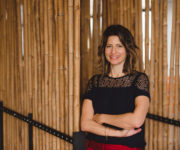Meet the Match
A Bolivian Sports Journalist Raises Generation of Superwomen
Carmen Pozo Rios was daydreaming in class again. She wanted to get to her next assignment. A sports journalist does not have time to waste, and there was still so much for her to learn.
Born and raised in La Paz, Carmen attended Catholic University of Bolivia, where she played volleyball and pursued a bachelor’s degree in social communications. As a student, however, she recognized her real interest was in sports media. One day, after class, she took her tape recorder and approached the famous Bolivian reporter Fernando Bustillo, asking him to help her become a real sports journalist.
“Fernando sent me to all the games so I could bring him news to put on his radio program,” Carmen recalls. “I didn’t know how to do interviews, so I’d talk to the volleyball and tennis presidents, for instance, and say, ‘I have to do an interview, Mr. President, but I don’t know how, so can you tell me what to ask you?’”
Carmen laughs at the memory now. Despite her early blunders, she quickly found her footing as a journalist, working on television and for local newspapers for the entirety of the 1990s. She was among the first recognizable women to cover sports in Bolivia.
“Sport is an area that was meant for men, and in Bolivia only men could talk about it,” Carmen says. “Then a woman started talking about sports—me—and I did it well. People started believing in me. And they think that I know more about sports than men. I opened the road to many other women to do the same.”
In 2007, Carmen and her best friend Zdenscka Bacarreza were preparing to launch a new television show. Her friend’s husband, Argentine sports journalist Fernando Berdeja, suggested the duo, who were known for having fun and working hard together, call themselves las super poderosas (“super powerful women”). The name stuck and the show became a hit.
“There is even a girl’s wheelchair basketball team in Bolivia with the same name,” Carmen says, “inspired by our television program. Everywhere we go people know us as the super poderosas.”
In 2015, the program evolved into a free magazine that Carmen and her colleague publish and distribute throughout La Paz. The positive response propelled the women to launch their own soccer academy by the same name. Carmen convinced the principal at St. Andrews School, where she works as a kindergarten teacher, for permission to use their soccer field. From the 18 girls who showed up to the first practice two years ago, the number has more than tripled. Girls are graduating from the academy and becoming coaches—it is the country’s only soccer academy with five female coaches. Now even mothers attend practice after seeing the positive changes taking place in their daughter’s lives.
“People think soccer is a man’s sport only because they never see women playing it,” Carmen says. “But sport gives you power. Girls carry themselves different after kicking a soccer ball. They’re confident. Other girls see this and want to play. Even the boys look at the girls practicing and see there’s no difference between them.”
Bolivia is ranked 23rd among 144 countries by the World Economic Forum’s Global Gender Gap Report. But, while the country is a world leader in women’s health and political empowerment, it still faces other gender challenges. Bolivia ranks 98th in the world in women’s economic participation and educational attainment, and gender-based violence has proven to be a very serious issue nationwide. Despite a 2013 law against femicide, there have been thousands of reports of violence in the past four years.
Carmen believes sport can play a lead role in addressing Bolivia’s gender issues. After arriving to the U.S. Department of State and espnW Global Sports Mentoring Program with a decorated resume in the media industry, she believes the program also equipped her with new tools to make an even broader impact. Among her ideas, Carmen strives to create a city-wide public awareness campaign using short radio messages, billboards, and posters with Bolivia’s most popular athletes sending positive messages about women and encouraging them to play. She also wants to use the academy to recruit and train more girls to become athletes and soccer leaders.
“I stick my nose everywhere and I like to fight for what is right,” Carmen says. “Sometimes people pay attention, sometimes they don’t. But I will never stop trying.”
Romina Bongiovanni, group director of earned media and public relations for Saatchi & Saatchi Los Angeles, is the ideal mentor for Carmen. A prominent Latina leader in the U.S. media industry who has decades of experience in creative campaigns for top international brands such as Pepsi and DirecTV, she is a key source of knowledge and innovation. Together, Carmen and Romina form a powerful duo of strong women with a commitment to spreading the message and impact of women’s sports throughout Bolivia.


